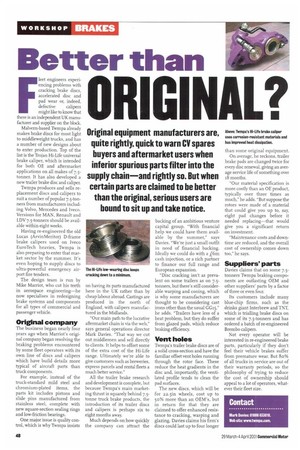R IG NAL?
Page 50

If you've noticed an error in this article please click here to report it so we can fix it.
on having its parts manufactured here in the UK rather than by cheap labour abroad. Castings are produced in the north of England, with calipers manufactured in the Midlands.
"Our main path to the lucrative aftermarket chain is via the web," says general operations director Mark Davies. "That way we cut out middlemen and sell directly to clients. It helps to offset some of the extra cost of the Hi-Life range. Ultimately we're able to give customers such as breweries, express parcels and rental fleets a much better service."
All the trailer brake research and development is complete, but because Twmpa's main marketing thrust is squarely behind 7.5tonne truck brake products, the introduction of its trailer discs and calipers is perhaps six to eight months away.
Much depends on how quickly the company can attract the backing of an ambitious venture capital group. "With financial help we could have them available by the summer," says Davies. "We're just a small outfit in need of financial backing. Ideally we could do with a L6m cash injection, or a rich partner to finance our full range and European expansion.
"Disc cracking isn't as prevalent on some trailers as on 7.5tonners, but there's still considerable warping and coning, which is why some manufacturers are thought to be considering cast irons other than the usual GGI5," he adds. "Trailers have less of a heat problem, but they do suffer from glazed pads, which reduce braking efficiency.
Vent holes
Twmpa's trailer brake discs are of a solid cross-section and have the familiar offset vent holes running through the rotor face. These reduce the heat gradients in the disc and, importantly, the ventilated profile tends to clean the pad surfaces.
The new discs, which will be for 22.5in wheels, cost up to 50% more than an OEM's, but in return for that they are claimed to offer enhanced resistance to cracking, warping and glazing. Davies claims his firm's discs could last up to four longer
Above: Twmpa's Hi-Life brake caliper uses corrosion-resistant materials and has improved heat dissipation.
than some original equipment.
On average, he reckons, trailer brake pads are changed twice for every disc renewal, giving an average service life of something over 18 months.
"Our material specification is more costly than an OE product, typically over three times as much," he adds. "But suppose the rotors were made of a material that could give you up to, say, eight pad changes before it needed replacing—that would give you a significant return on investment.
"Maintenance costs and downtime are reduced, and the overall cost of ownership comes down too," he says.
Suppliers' parts
Davies claims that on some 7.5tonners Twmpa braking components are outlasting OEM and other suppliers' parts by a factor of three or even four.
Its customers include many blue-chip firms, such as the drinks giant Interbrew and TNT, which is trialling brake discs on some of its 7.5-tonners and has ordered a batch of re-engineered Brembo calipers.
Not every operator will be interested in re-engineered brake parts, particularly if they don't feel their vehicle brakes suffer from premature wear. But So% of all trucks in service are out of their warranty periods, so the philosophy of trying to reduce the cost of ownership should appeal to a lot of operators, whatever their fleet size.








































































































